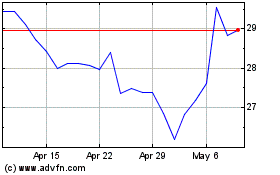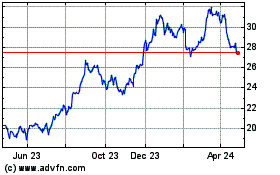Majority of investors plan to adjust
portfolios based on election outcome; 25% considering pulling out
of the U.S. stock market
UBS Wealth Management Americas (WMA) today released its
quarterly UBS Investor Watch report, "Electing the economy,"
illustrating wealthy investors’ serious concerns about the
potential impact of the U.S. presidential election on the economy,
which 84% cite as a top issue in this election.
Economically, 68% of wealthy investors feel that the country has
lost its competitive edge, and more than half (57%) believe that it
is more difficult for Americans today to rise up from humble
beginnings. Only a third of wealthy investors (33%) are optimistic
that future generations will have it better than we do today.
"Across party lines, investors see the economy as the biggest
issue in the election, outranking concerns like healthcare,
national security and foreign policy," said Paula Polito, Client
Strategy Officer of UBS Wealth Management Americas. “Where
investors diverge among party lines is on what it will take to fix
the economy."
A game-changing election
Politically, Investor Watch found that wealthy investors are
relatively evenly split among the major affiliations, with 27%
identifying as Democrats, 34% identifying as Republicans and nearly
one-third (31%) identifying as independents. Baby Boomers and the
WWII/Swing generations tend to be more conservative, with higher
proportions leaning Republican. Millennials skew more liberal, with
39% affiliating themselves with the Democratic Party.
Regardless of their party affiliation, the vast majority of
investors (77%) believe this presidential election is a
"game-changing" event that will have a major impact on the
direction of the country. Three quarters (74%) said they are
nervous about what will happen after the election regardless of
which candidate wins. Another 75% believe this year’s contest is
more significant than others in recent history, and eight in ten
(81%) can’t remember an election with two more divergent
candidates.
Agree on Priorities, Disagree on Solutions
Irrespective of their political leanings, investors ranked
economic issues above healthcare (79%), national security (78%),
terrorism (70%) and immigration (57%) as the biggest issue in the
election.
However, there is widespread disagreement along party lines in
terms of the best ways to improve the U.S. economy. For example,
more than three-quarters (77%) of investors identifying as
Democrats believe that raising the minimum wage would have a
positive impact on the economy, compared to less than a quarter
(24%) of Republicans and 43% of independents.
Similarly, 72% of those identifying as Republicans feel that
strictly enforcing immigration laws would help the economy, while
only 35% of Democratic investors and half of independents (52%)
agree. Most Democrats (85%) believe investing in clean energy would
positively impact the U.S. economy, while most Republicans and
independents (86% and 78%, respectively) feel that balancing the
budget would help improve the economic situation.
Investors across party lines agree on two actions that can
stimulate the economy. The vast majority of investors say that
investments in infrastructure (87%) and research (85%) will help
jump-start the economy.
Investment Implications
Regardless of which candidate or party they support, wealthy
investors demonstrate high expectations for their favored candidate
to boost stock market returns; 61% predict that if their chosen
candidate wins, it will have a positive impact on the stock market.
On the other hand, should the opposing candidate win, 64% believe
it will negatively impact U.S. markets. A much smaller percentage
of investors believe that the outcome of the election will not
impact the U.S. markets at all (33% for the candidate they support,
26% for the candidate they oppose).
"There is tremendous uncertainty about the election and
investors expect the outcome to impact stock market returns either
way," said Sameer Aurora, Head of Client Strategy for UBS Wealth
Management Americas. "Investors are hoping for the best, but 57%
are considering reallocating their portfolios, and 10% have already
done so."
Nearly half of investors (47%) are considering reducing their
allocations to stocks, while 9% have already reduced their
holdings. A full quarter (25%) of investors are considering pulling
out of the stock market entirely, and 5% have done so. Regarding
cash holdings, Investor Watch has found that investors continue to
hold a cash cushion of around 20%. Four in five investors (81%)
report that they have not yet consulted with their Financial
Advisor about potential implications of the election.
UBS ElectionWatch
Investor Watch is the latest in a series of UBS Wealth
Management Americas events and content focused on providing
in-depth insights and unique perspectives on the 2016 U.S.
Presidential election, a top-of-mind concern of investors today.
Earlier this month, the Firm launched its ElectionWatch 2016 client
event series in Hartford, CT that will continue in key cities
across the country leading up to the general election. In
conjunction with this event, WMA’s dedicated Chief Investment
Office Wealth Management Research unit (CIO WMR) published the
sixth volume of its industry-leading ElectionWatch 2016 research
report.
We invite you to read the full report here:
www.ubs.com/investorwatch
About UBS Investor WatchUBS Wealth Management Americas
surveys U.S. investors on a quarterly basis to keep a pulse on
their needs, goals and concerns. After identifying several emerging
trends in the survey data, UBS decided in 2012 to create the UBS
Investor Watch to track, analyze and report the sentiments of
affluent and high net worth investors.
MethodologyFor this 16th edition of UBS Investor Watch,
2,344 affluent and high net worth investors responded to our survey
from June 6 – 14, 2016. The core sample of 1,912 investors have at
least $1 million in investable assets, including 453 with at least
$5 million. With 90 survey respondents, we conducted qualitative
follow-up interviews. This UBS Investor Watch also includes an
oversample of 580 Millennials:
- Respondents ages 21 – 29 who have at
least $100,000 in household income or $100,000 in investable
assets
- Respondents ages 30 – 36 who have at
least $250,000 in investable assets
Notes to editors
About UBS Wealth Management AmericasWealth Management
Americas is one of the leading wealth managers in the Americas in
terms of financial advisor productivity and invested assets. It
provides advice-based solutions and banking services through
financial advisors who deliver a fully integrated set of products
and services specifically designed to address the needs of
ultra-high net worth and high net worth individuals and families.
It includes the domestic U.S. and Canadian business as well as the
international business booked in the U.S.
About UBSUBS is committed to providing private,
institutional and corporate clients worldwide, as well as retail
clients in Switzerland, with superior financial advice and
solutions while generating attractive and sustainable returns for
shareholders. Its strategy centers on its Wealth Management and
Wealth Management Americas businesses and its leading universal
bank in Switzerland, complemented by its UBS Asset Management
business and its Investment Bank. These businesses share three key
characteristics: they benefit from a strong competitive position in
their targeted markets, are capital-efficient, and offer a superior
structural growth and profitability outlook. UBS's strategy builds
on the strengths of all of its businesses and focuses its efforts
on areas in which it excels, while seeking to capitalize on the
compelling growth prospects in the businesses and regions in which
it operates. Capital strength is the foundation of its success.
UBS is present in all major financial centers worldwide. It has
offices in more than 50 countries, with about 35% of its employees
working in the Americas, 36% in Switzerland, 17% in the rest of
Europe, the Middle East and Africa and 12% in Asia Pacific. UBS
Group AG employs about 60,000 people around the world. Its shares
are listed on the SIX Swiss Exchange and the New York Stock
Exchange (NYSE).
View source
version on businesswire.com: http://www.businesswire.com/news/home/20160725005581/en/
UBSNew York: Gregg Rosenberg, 212-713-8842Follow us on Twitter:
@UBSAmericaswww.ubs.com/media
UBS (NYSE:UBS)
Historical Stock Chart
From Mar 2024 to Apr 2024

UBS (NYSE:UBS)
Historical Stock Chart
From Apr 2023 to Apr 2024
